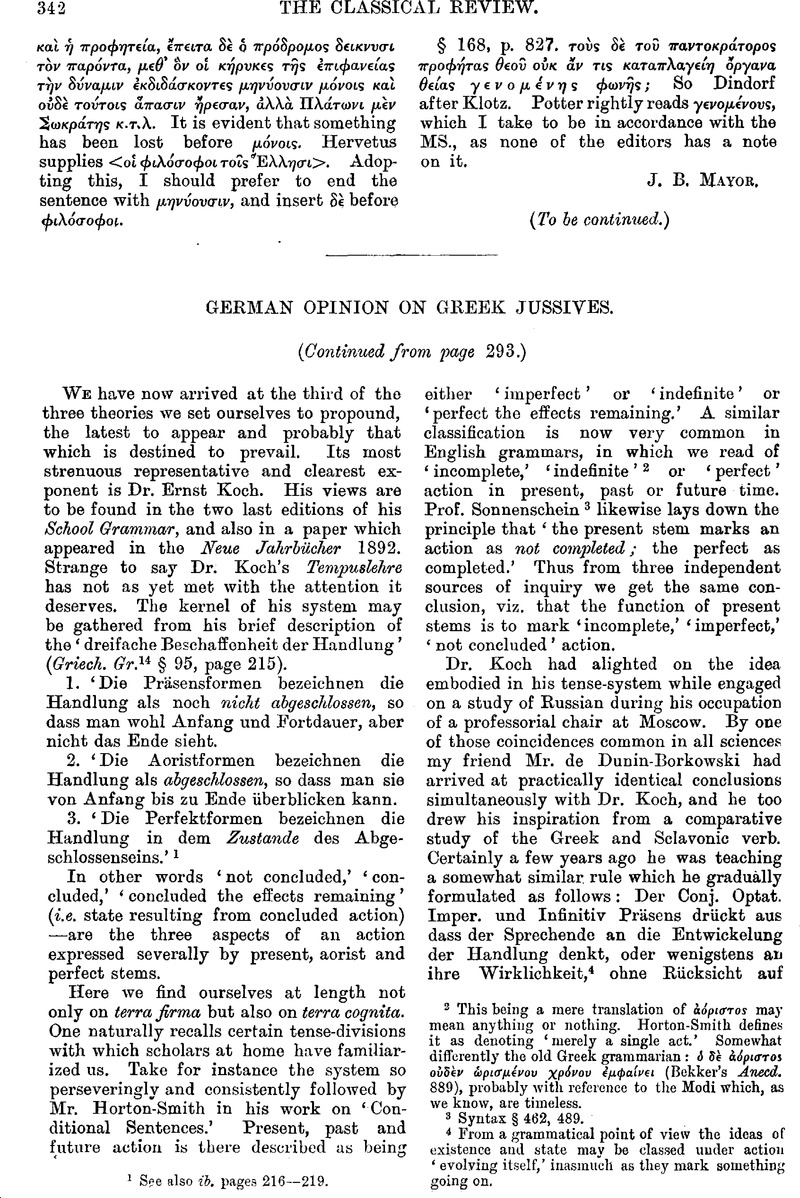No CrossRef data available.
Article contents
German Opinion on Greek Jussives
Published online by Cambridge University Press: 27 October 2009
Abstract

- Type
- Review Article
- Information
- Copyright
- Copyright © The Classical Association 1895
References
page 342 note 1 See also ib. pages 216—219.
page 342 note 2 This being a mere translation of ἀόριστoς may mean anything or nothing. Horton-Smith defines it as denoting ‘merely a single act.’ Somewhat differently the old Greek grammarian: ![]() (Bekker's Anecd. 889), probably with reference to the Modi which, as we know, are timeless.
(Bekker's Anecd. 889), probably with reference to the Modi which, as we know, are timeless.
page 342 note 3 Syntax § 462, 489.
page 342 note 4 From a grammatical point of view the ideas of existence and state may be classed under action ‘evolying itself,’ inasmuch as they mark something going on.
page 343 note 1 This is not the first time we hear of evolution or Entwickelung in connection with the function of present stems. Koch used the word in the 8th edition of his Grammar § 998. 1. It occurs also in Curtius-Hartel (ed. 19, § 194. 1) and in Kaegi 2nd ed. § 187. 1. This term was however often erroneously identified with that of duration. The two ideas are carefully kept apart in Goldbacher, Lat. Gr.5 § 387, 394, Koch 14 Aufl. § 98. 1.
page 343 note 2 Many passages are forthcoming from Attic Greek which are more readily explained if looked at in the light of the negative portion of the definition above given. Koch in applying his general rule to the indicative mood (§ 98) makes use also of the term ‘sich entwickelnd.’.
page 343 note 3 Rhein. Mus. N. F. 44 Bd. (1889), page 406—430.
page 343 note 4 In Synt. Forsch. v. Altind. Syntax (p. 277) Delbrück's description of present stem function is very similar to the one here propounded: Der Praesenstamm dient, wie in den andern Sprachen dazu, eine vor sich gehende Handlung zu bezeiehnen. This is our ‘action going on.’
page 344 note 1 Brugmann, § 159.
page 344 note 2 I may here once and for all express my indebtedness to Mr. de Dunin-Borkowski, to whose many suggestions this paper owes whatever it possesses of value.
page 344 note 3 Our argument is from the actual syntactical force of these forms in modern Polish, whatever be their genesis.
page 344 note 4 A good illustration of the two idioms is the following. A headmaster calls up a boy and says: ‘sit down and write a letter to your father.’ He has before his mind the actual writing; he would use γράφε. Another time he sends for the same boy and says: ‘Go write to your father’; he would use γράψον. In the latter case the executed task is thought of; in the former the writing pictures itself as going on before his eyes.
page 345 note 1 Notice the danger of employing English formulae to represent the force of jussives and other constructions. Cf. Goodwin, M.T. § 87, ‘ποίει τοντο do this (habitually).’ It looks as if Prof. Goodwin limited the pres. imp. to habitual action! The bracketed ‘habitually’ throughout the paragraph is very misleading.
page 345 note 2 Hence Blass is too severe on O. Rieman when, criticizing the latter's admission that in a considerable number of passages there is no difference between pres. and aor., he goes on to comment: Dies Ergebniss ist, sollte ich meinen, einleuchtend falsch. Moreover Koch (N. Jahr. pg. 409 sq.) has shown that, in the case of many verbs, custom gave a preference to the use of one stem rather than the other. Thus in Xen. An. i.—iv. we find νομίζω used 7 times in impf., in aor. once; ἡγεισθαι impf. 10, aor. 0; βολούμαι impf. 7, aor. 0. These phenomena however may be otherwise accounted for.
page 346 note 1 I think it is safe to say there exists no Aoristus de Conatu in Greek. Such examples as Ion 1291 ![]() …1286
…1286 ![]() do not refer to attempted murder but rather by a sort of figurative diction to murder accomplished as far as intention and means taken could effect it.
do not refer to attempted murder but rather by a sort of figurative diction to murder accomplished as far as intention and means taken could effect it.




